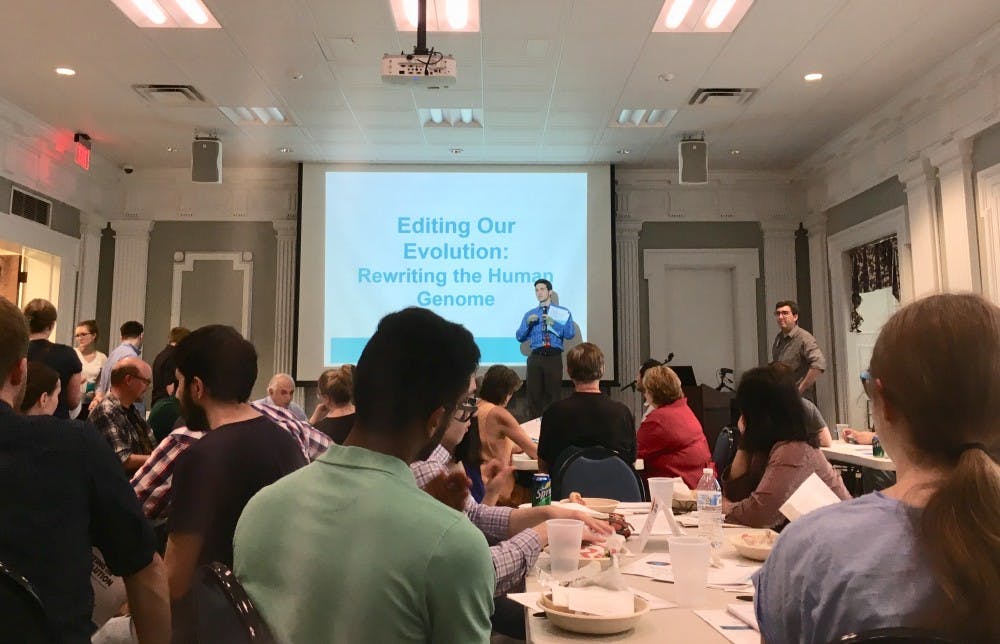Open Bio Labs — an organization that provides access to scientific education and resources for learners of all ages — led a forum entitled “Editing our Evolution: Rewriting the Human Genome” last Wednesday at the Jefferson-Madison Regional Library on the Downtown Mall.
As part of the National Science Foundation’s larger initiative to develop policies on human genome editing based on public opinions, Open Bio Labs was selected to host one of 24 conversations nationwide on the advancements in and ethical questions concerning genetic engineering.
Approximately 80 people of diverse ages and backgrounds attended the event. While everyone came to the event for a variety of reasons, most people wanted to learn more about how others approached the potential moral dilemmas and policy issues surrounding technology that could eradicate certain illnesses entirely.
“It’s an interesting topic to discuss, and I want to learn more about the state of genetic research,” said Arthur Conover, a member of Cville Comm-UNI-ty, a non-profit dedicated to fostering interest in science and technology in the wider Charlottesville area.
Graduate Medical Student Justin Elfman also expressed a curiosity toward the differing viewpoints he might encounter during the discussions.
“I know where I draw my lines, but it’s always interesting to hear different views on the same topic,” Elfman said. “I’m hoping to hear different perspectives, because I know with my bioengineering background, people are talking about starting to use gene editing.”
Co-founder of Open Bio Labs Shaun Moshasha opened the event with a brief overview of the impacts of gene editing on both the scientific community and the public. Mazhar Adli, an assistant professor of Molecular Biology and Genetics, then gave a presentation on CRISPR/Cas9, a tool for adding and removing specific portions of a person’s genetic code.
“The ability to change DNA has been the holy grail since the beginning of molecular biology,” Adli said. “Now, gene editing tools enable us to open the file of the genome and write it.”
Following the introductions, participants formed small groups to discuss three hypothetical scenarios. Each person was given a packet with the questions posed by the National Science Foundation and the option to record their thoughts and fill out a demographic survey to help inform the National Science Foundation, which is drafting genetic engineering policies.
The first scenario asked participants to decide if they would use gene therapy on their young son with a genetic disorder that severely decreased his average life expectancy, and if they would then use a genetic technique on their healthy child to enhance his or her athletic abilities. These two situations specifically addressed the growing concerns about drawing distinct lines between gene therapy versus genetic enhancement.
In addition, participants examined debates around access to new treatments for citizens of a variety of backgrounds and incomes. Specifically, the question proposed a case in which the participant was afflicted with sickle cell disease, a condition that disproportionately affects African-Americans and Latinos, and was faced with the decision to undergo a potentially dangerous genetic treatment involving a bone marrow transplant.
The question also asked participants how they would address a dilemma in which such treatment was too expensive for certain patients to afford.
Finally, participants delved into a situation in which they were a young adult with the heritable BRCA mutation, which significantly increases the risk of developing breast cancer. Faced with the option of implanting an embryo without the BRCA mutation and ensuring that any descendants would have the healthy version of the gene, groups looked at the ethics of altering the genomes of generations to come.
At the end of the event, Moshasha commended everyone on their willingness to contribute to conversations and respect contrasting opinions, a sentiment that Open Bio Labs volunteer Sofia Gasperino echoed.
“I think the turnout was really great, and there was a really awesome mix of people,” Gasperino said. “Everyone seemed interested in talking about how they felt about the scenarios, and even though people felt differently about them, for different reasons, we could all come to some sort of agreement.”
In the future, Open Bio Labs hopes to further examine the ramifications of the genetic revolution.
“These questions are far from being answered, and that’s why we have events like this to discuss them,” Moshasha said. “And while technology can be scary, we do not stop in our tracks. We come together and talk about it so we can move forward in a reasonable manner.”







